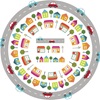Note: This article is Part One of a two-part interview. Click here to see the second half of this discussion.
SmallGroups.com: One the first page of the introduction to Missional Renaissance, it says "The rise of the missional church is the single biggest development in Christianity since the Reformation." That was intriguing to me. Can you flesh that out a little bit?
Reggie McNeal: It's interesting. I've made that comment to Lutheran pastors, and they don't even argue with me—they own the Reformation! What I'm seeing, in terms of the confluence of various forces and a recasting of the expression of the church and the world, I think that what we are undergoing currently is the largest recasting of that since Reformation times, and it's happening worldwide.
The missional church, in my opinion, is being informed by practices and by the work of God really that started overseas. Most Americans think the USA is God's only zip code, but as you well know we're in the backwaters of the Christian movement here on the planet today. And so it's really something that started where we're seeing a Day of Pentecost every hour. And then as it came to America, we tried to distill out some of the learnings and some of the key DNA of that, and then it got tagged as "missional."
It really is an expansion of what we think the church looks like, all the way from house churches to mega-churches. And so that's why I call it the biggest development, because I think it has the most far-reaching implications—both in terms of structure and how the church sees itself and what we think the church is. It's not just methodology. It goes to the core of the church's being, much like the Reformation did.
Your book is centered on three "shifts" in our current thinking. Can you briefly explain these changing ways of thinking?
Yes. Almost everyone gets the first one. It's the shift from an internal to an external focus in ministry. When we think about "missional," almost everyone thinks about running out and painting a school or fixing up some park or something. The problem, of course, is that if that's just an activity layered on top of our other activities, then their really hasn't been a profound shift in focus—just a shift in activity. Being missional moves us from internal concerns to external concerns. We start every question not with "What are we doing here," but "What is our impact out there."
The second shift is enormous, and it is the hardest one. It's the shift from a program-driven culture to a people-development culture. And this is in terms of the core activity of the church. You and I have grown up and lived our lives in the program church. We know how to do programs. In fact, we think of church as a collection of programs. Even worship and religious education, our missions program—these are all programs.
I was in Dallas last week and one of the churches I'm working with was in the dead center of Hurricane Ike. And the lead pastor there made such a great observation. He said, "You know, Reggie, we discovered when we had no building to go to that we couldn't have activities. We were without power ten days. We suddenly all came to a stunning realization that we pastor programs and not people, because we didn't know what to do with ourselves." And he said, "So we decided that we would go hang out with people and see what happens." And of course, that's the point.
A lot of people that entered ministry to make a difference in people's lives wind up being project managers and program directors. It's not that programs are evil; they've just become the substitute activity for the real deal. We assume that if people participate in programs, they fall out the other end as fully devoted followers of God. But of course the Reveal study has cast a new light on that kind of thinking.
For the most part, we don't know how to craft a people-development culture. It requires backing up and rethinking assumptions about all of our resources and how they are allocated—in terms of our time, what we do with our staff, what we do with our schedule, and how people really grow. It's quite a challenge.
What about the third shift?
The third shift is the move away from a church-based self perception and leadership, and a move toward what I call "kingdom leadership," which is community engaged. This is to signal the fact that we need to recapture what it means to be a leader of a movement as opposed to an institutional manager. Again, this is a profoundly different agenda.
In A.D. 30, nobody has a church job. So in the 21st century we're going to have to recapture what it means to be missionaries—it's really an apostolic ministry of making sure that everyone in our sphere of influence, the communities we live, actually hears the good news. What happens in church-based leadership is that our functions shrink down to teaching and managing. We've got to recover what it means to be apostolic and evangelistic and prophetic.
I have heard you speak a few times, and I've always been intrigued by the phrase "Six Flags over Jesus." Can you explain that phrase a little bit more, and how it represents the program-driven church?
Well, first let me say that I'm not trying to antagonize anyone that's running one of these massive program-generating churches. I use that phrase in a tongue-in-cheek way, and it probably comes across harder than I mean in print.
But the point is that we have built these attractional churches that are not only program-generated, but also dependent on increasing numbers of attenders in order to keep going. And it's not that long a step from getting dependent on having more people come through the turnstiles. Once you get to that point it becomes much more challenging to think of yourself as a "give away" institution—as externally focused, as a developer of those people that come through instead of just processing them and seeing them as resources to operate the plant. In other words, it's problematic for being salt and light if your main strategies are centered on attraction and assimilation.
The missional church reverses that kind of thinking and has a very different score card. It's really not the number of people that pour through our facilities, but the quality of life experienced and deployed by Jesus' followers.
Small Groups are one of the biggest programs in many churches today. Do you see that ministry contributing to the program-driven approach?
I am a huge fan and proponent of small groups. After all, I'm a boomer, and that's a boomer phenomenon. I really think that people need a group that they have enough face time and heart time with to unpack their lives. The challenge for many small groups in churches is that they've become curriculum driven and, again, part of a program targeted at assimilating people.
So, what I don't like is the assumption that if people are in a small group, then they are taken care of and that they're growing and all of that. Even as a pastor of a church with lots of small-group participation, I found that very often was a poor assumption. It's very possible for a small group to be just another way of processing people, and we weren't holding a high enough bar on whether or not they were actually growing.
So what would your dream be for a small-groups ministry in a missional or kingdom-based church?
There would be two primary focuses of a missional small group. One would be that we serve together. Part of the DNA of being a follower of Jesus is, "Do you love your neighbor as yourself?" I mean, what part of this have we missed? It's not "Do you know the Bible" or "Can you have prayer requests and share those and love on each other." So serving others would not be an add-on, but something central to the small-group experience.
Second, there would be an intentional debriefing of life that is life-centered, not curriculum-centered—and this would actually help people learn from their service. Whether we go out to serve the homeless or renovate houses or whatever, we would constantly be asking ourselves debriefing questions that address what we're learning about God's work in the world, what we're learning about our own biases and prejudices, what's being challenged in us, what we're learning about the group, and so on. And then that we would come and unpack the rest of our lives.
I'm not against curriculum. I've written some of it. It's fabulous. But what really needs to happen in a small group is for people to make sense out of their lives. It's easy in a curriculum-based discussion to come together and discuss the Bible, but not ever talk about what I'm going to do differently this week or how I'm really feeling. And so I think a missional small group would be more about other types of questions: Am I growing? Am I experiencing more of Jesus in my life every day?
—Reggie McNeal serves as the Missional Leadership Specialist for Leadership Network; he is the author of several books, including Missional Renaissance.
Copyright 2009 by the author and Christianity Today.









